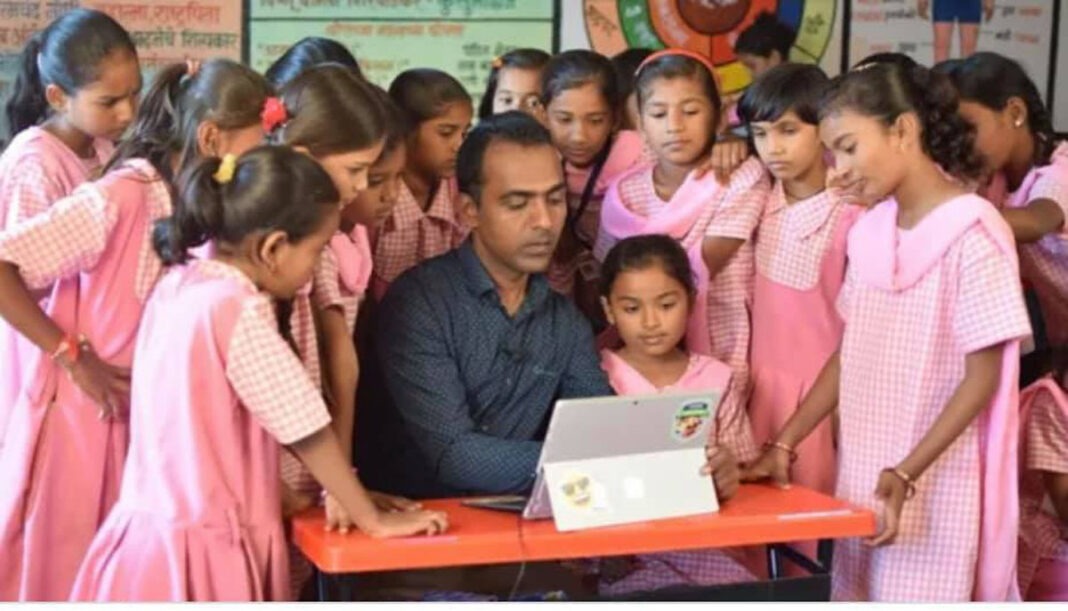INDIA. Mumbai: Ranjitsinh Disale, a 32-year-old Zilla Parishad (ZP) primary school teacher from Western Maharashtra, was recently honored with the Global Teacher Prize 2020 by Varkey Foundation, UK, and UNESCO.
Also Read: Professionals Awarded For Gender Sensitivity In Electronic And Print Media
Disale was named the winner of the USD one-million annual “Global Teacher Prize 2020” in recognition of his efforts to promote girls’ education and trigger a quick-response (QR) coded textbook revolution.
Global Teacher Prize
The Global Teacher Prize was instituted in 2014. The “Global Teacher Prize 2020” winner’s announcement was made at a virtual ceremony broadcast from the Natural History Museum in London by British actor-broadcaster Stephen Fry. On being named the winner for the coveted prize, Disale, announced that he will be sharing 50 percent of his prize money with his fellow finalists to support their “incredible work”. His generous gesture means the other nine finalists will receive over $55,000. Disale was honored by the Varkey Foundation and UNESCO.
The Varkey Foundation is a global charitable foundation focused on improving the standards of education for underprivileged children. Nominations of teachers who meet specific criteria are open to the worldwide public. The teachers can also nominate themselves. The prize is paid out in equal installments over 10 years, with the foundation providing winners with financial counseling and support through an ambassadorial role for the profession.
Disale was selected in the final 10 from over 12,000 nominations and applications from over 140 countries, alongside Olasunkanmi Opeifa from Nigeria, Jamie Frost from the UK, Carlo Mazzone from Italy, Mokhudu Cynthia Machaba from South Africa, Leah Juelke from the US, Yun Jeong-Hyun from South Korea, Samuel Isaiah from Malaysia, Hà Ánh Phượng from Vietnam and Doani Emanuela Bertan from Brazil.
Disale’s journey to success
When Disale arrived at the ZP Primary School at Paritewadi in 2009, it was a dilapidated building, sandwiched between a cattle shed and a storeroom. Most of the girls were from tribal communities that did not prioritize girls’ education. Along with this, the practice of teenage marriage was a major problem at that time. Additionally, the curriculum was not in the students’ primary language (Kannada). Due to this, many students were unable to achieve expected learning outcomes.
After a lot of effort, Ranjitsinh learned Kannada and redesigned all the textbooks of grades 1-4 for better comprehension. He added unique QR codes that embedded audio poems, video lectures, stories, and assignments in Kannada. These books benefited many girls since they were able to continue learning even after the schools remained close.
As a result of Disale’s efforts, his school was given the ‘Best School Award’ in the district in 2016. In the same year, around 98 percent of students achieved their expected learning outcomes before completing the school year. His school went on to become the first in Maharashtra to introduce QR codes. After submitting a successful pilot scheme, in 2017, the Maharashtra Government announced that they would introduce QR coded textbooks across the state for all grades.
Subsequently, QR code textbooks were distributed to 60 lakh children through “Bal Bharati”. In 2018, the Union Human Resources Development Ministry announced that all the National Council of Education Research and Training (NCERT) textbooks would have embedded QR codes.
Recognition of his works
In terms of his wider impact, the CEO of Microsoft Satya Nadella recognized his work and included his work in the book named “Hit Refresh”. In 2016, the central government named him, “Innovative Researcher of the Year”. He also won the National Innovation Foundation’s “Innovator of the Year award” in 2018. Disale has written over 500 newspaper articles and blogs besides participating in television discussions and debates on educational topics. He has received over 12 international and seven national awards so far.
Disale’s peace initiative
After studying India-Pakistan, Iran-Iraq, Israel-Palestine, and USA-North Korea conflicts, Disale raised a “Peace army” of 5000 students from eight different countries. He is also passionate about building peace between young people across conflict zones. For this, he started a six-week project named “Let’s Cross the Borders“. Under this project, students were matched with a peace buddy from other countries with whom they closely interacted. So far, he has initiated over 19,000 students from eight countries into this program. He also regularly organizes virtual meetings with teachers across the globe. With the use of the Microsoft Educator Community platform, Disale spends his weekends taking students from schools around the world on virtual field trips.
“I am happy that the rate of school drop has come down and even girls complete their education. The COVID-19 pandemic has exposed education and the communities it serves in a multitude of ways. In this hard time, teachers are also giving their best to make sure every student has access to their birthright of a good education. I dedicate this award to my fellow teachers and government officers”, Disale said in a video message sent to the Transcontinental Times.




Comments are closed.